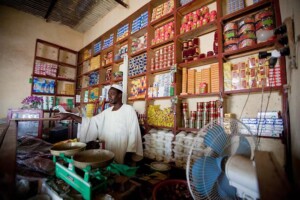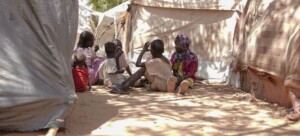Doctors angry over huge increase of public hospital fees
Doctors in the Sudanese capital strongly criticised the large, roughly tenfold increase of prices of medical services in government hospitals, which was decided on by the Khartoum state government.
 A patient and his relatives at the El Fasher Teaching Hospital (Albert González Farran/UNAMID).
A patient and his relatives at the El Fasher Teaching Hospital (Albert González Farran/UNAMID).
Doctors in the Sudanese capital strongly criticised the large, roughly tenfold increase of prices of medical services in government hospitals, which was decided on by the Khartoum state government.
The doctors see the price increases a ‘commodification of health services’ to bring more money to the state treasury at the expense of Sudanese citizens’ life standards.
Doctor Sayed Ganat told Radio Dabanga that hospital visit fees increased from SDG 20 to SDG 200, while bed fees now amount to SDG 2,000 per day instead of free hospitalisation. Formerly free caesarean sections now cost SDG 30,000.
The minimum medical examination costs now amount to SDG 500, while radiology fees increased from SDG 300 to SDG 1,500.
Doctor Ganat attributed the increases to the halt in international financial support following the military coup of October 25.
Doctors consider the price increases a commodification of health services and an attempt to supplement the Khartoum state budget from the citizen's pocket. They stress that the decision will exacerbate the suffering of people and make hospital treatment inaccessible to most Sudanese.
'This decision will exacerbate the suffering of people'
For example, a complex fracture in an arm now costs roughly SDG 965,000 worth of examinations, a hospital bed for four days, and other care in government hospitals. The operation for the fracture itself will cost 600.000.
Prices in private hospitals are much higher.
For comparison, rickshaw drivers earn between SDG 3,000 and 5,000 a day. Teachers in government schools earn between SDG 12,000 and 20.000, similar to factory workers on a salary. Freelance/temporary factory workers earn between SDG 7,000 and 10,000. Contracted engineers earn around SDG 50,000.
This means that treatment for an arm fracture will cost a rickshaw driver most of their yearly earnings. For more severe injuries, the costs will be much higher than what most Sudanese can afford.
Many people also have to travel far for health care. In the above example of a complex fracture in an arm, someone from El Obeid might have to travel all the way to Khartoum as complex fractions can only be operated there.
Because of the ongoing economic issues in Sudan, which have significantly worsened since the coup, trade the parallel foreign currency exchange market is slowly returning.
After the liberalisation of the exchange rate and other economic reforms last year, the Sudanese Pound witnessed a period of stability that lasted for six months, until the coup.
The Sudanese pound was liberalized by adjusting the official SDG exchange rate to that of the parallel market in an attempt to decrease the power of the parallel market.
Measles outbreak
Residents of Abu Seneidra in El Firdous locality, East Darfur, complain about the outbreak of measles among children.
They demand that the governmental and international health authorities take immediate action to save the children before the disease spreads further and becomes difficult to control.











 and then
and then